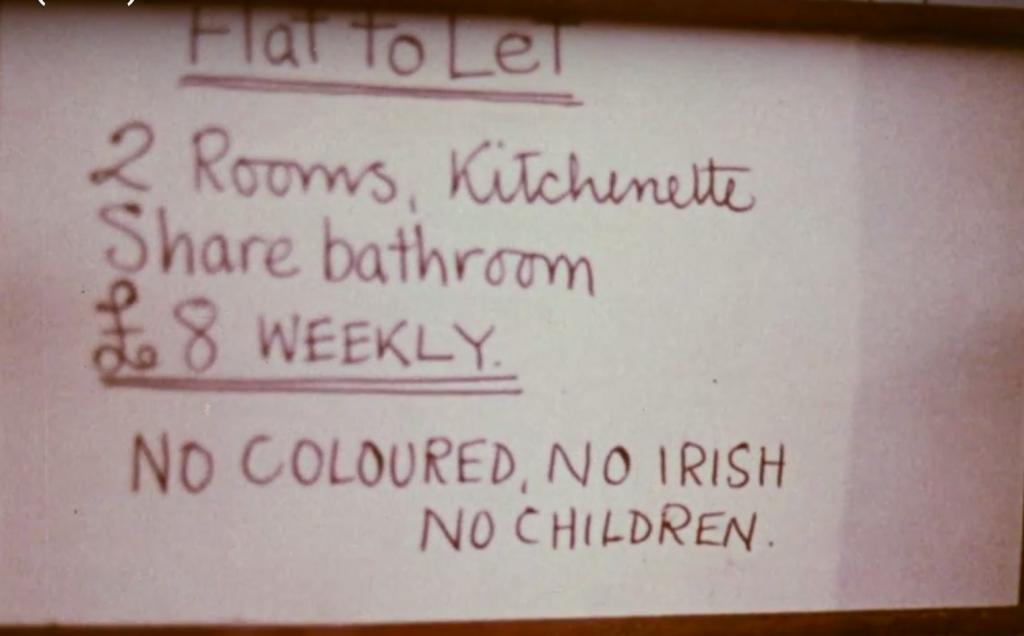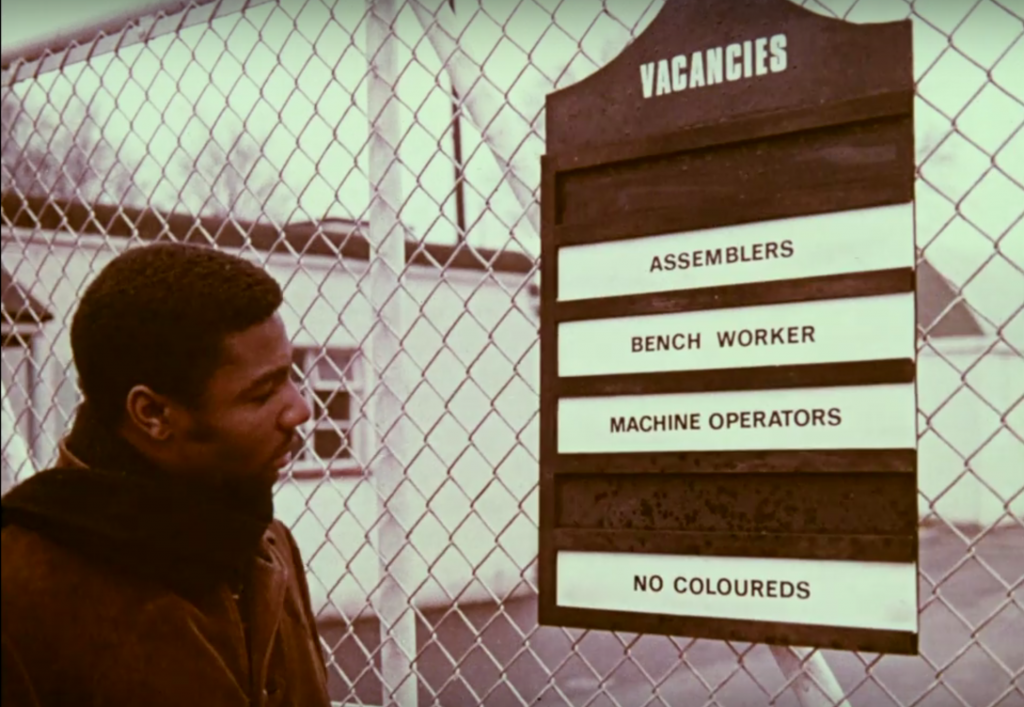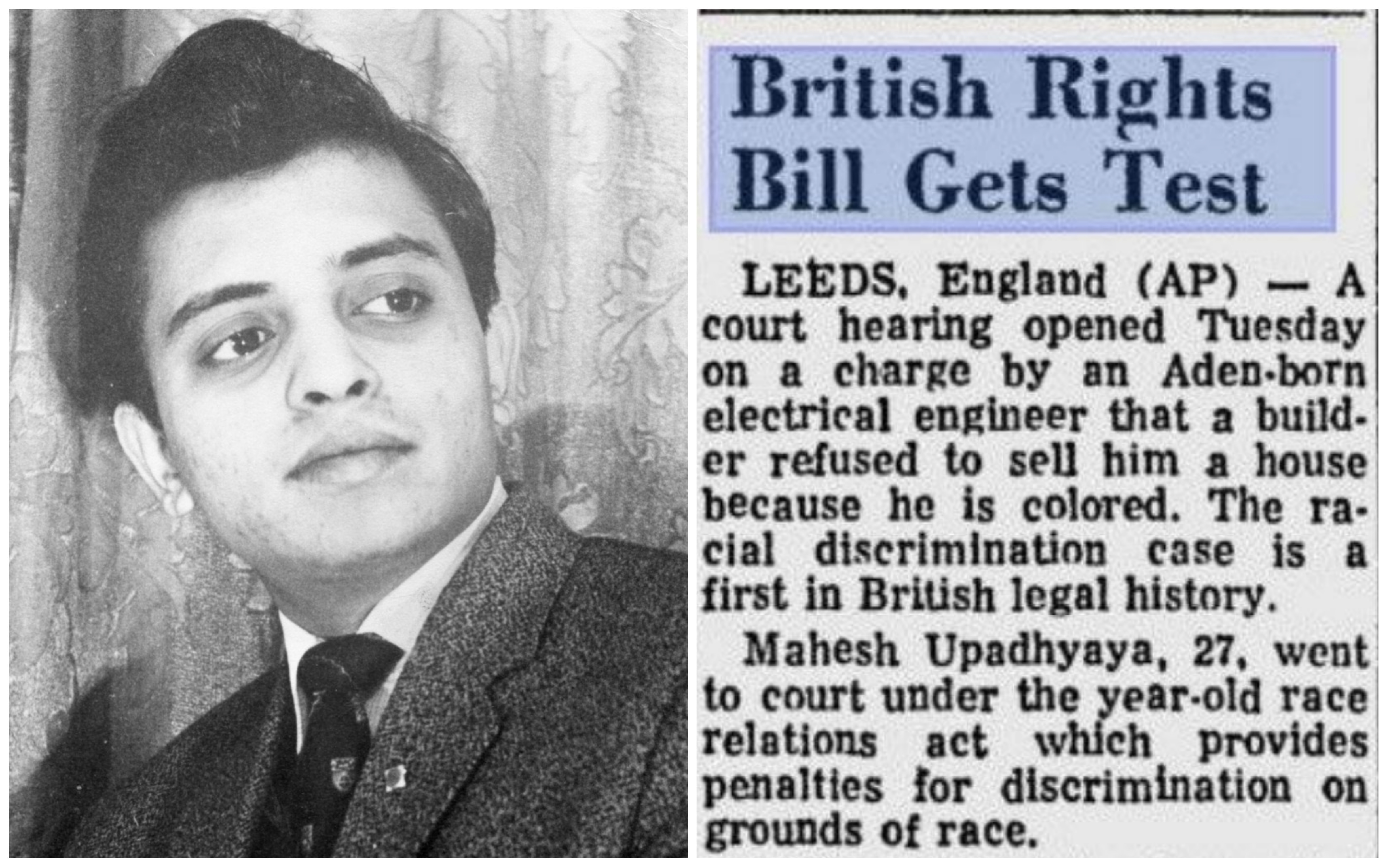In 1968 Mahesh Upadhyaya became the first person in the UK to bring a racial discrimination case to court using the recently introduced Race Relations Act 1968. In the week marking 50 years since the landmark equality legislation was introduced, RightsInfo exclusively talks to the 76 year-old about his case and how standing up to racism has given him a special place in British history.
I came to UK in 1961. I came from Aden, which is now in south Yemen – I was born in Mukulla, a small village near Aden, but also spent many years of my childhood with my grandparents in India where I went to school for a few years. I returned to Aden, in 1960, to do the equivalent of GCSEs and came to the UK in the summer of 1961 with 25 quid in my pocket. I was 18 and the first to come to the UK from our clan.
 Notices such as these were part of day to day to life in 1960s Britain Credit: Race Relations Board (1969) BFI/Crown on BFI Player
Notices such as these were part of day to day to life in 1960s Britain Credit: Race Relations Board (1969) BFI/Crown on BFI Player
When I first came here kids would shout ‘Comanchero’ at Asians. ‘The Comancheros’ was the John Wyane Western film in the cinema at the time and they thought Indians and Asians were red Indians from cowboy films.
When I went looking for digs it was standard to see signs saying ‘No blacks, no dogs, no Irish’.
As more and more Indians came to the UK it changed and people would shout ‘Paki’ at us. When I went looking for digs it was standard to see signs saying ‘No blacks, no dogs, no Irish’.
After I found a job with a regular salary I set about searching for a suitable home for my family. We found one on Penistone Road, at the edge of Huddersfield, close to my employer’s transport routes.
Our policy is not to sell to coloured people because that will jeopardise the sales of our other properties.
I arranged an appointment and everyone, my parents, brother, my wife and myself, went along. We found no problems at all with the house, a spacious three-bedroom semi, and wanted to make an offer. So I rang the developers, George Haigh & Sons, later that day.
The person on the phone said, “Are you the coloured family who had a look around earlier?”
I said that we were.
The person on the phone said, “Our policy is not to sell to coloured people because that will jeopardise the sales of our other properties.”
This statement, spoken so casually, stunned me, but I had enough presence of mind to remind him of the recent Race Relations Act. Passed in 1968, it made it illegal to refuse housing, employment or public service to a person on the grounds of colour, race, ethnicity or national origin.
Without skipping a beat, he told me he knew of it and that it made no difference. I promptly reported the incident to the local community relations officer, who insisted that I lodge a formal complaint.
I worried about the repercussions of taking the matter that far but eventually I was persuaded it was the right thing to do, for the community.
I was the first person ever to bring a case of racial discrimination under the Race Relations Act.
A public information film about the Race Relations Act 1968 Credit: Race Relations Board (1969) BFI/Crown on BFI Player
A week later, a solicitor from the Race Relations Board interviewed me at work. His appearance in this setting alarmed me because I really did not want to deal with such a sensitive issue in my workplace, in the midst of my colleagues. We agreed the Race Relations Board would sue the builder and I would claim nominal damages of £2 against the builder.
The atmosphere at work became charged and unpleasant. Many people disagreed with my decision to pursue this case. In particular, an engineer who I worked with and who was a friend of the builder, thought I was out to destroy his friend’s livelihood.
As much as I wanted justice, I did not want to imperil my employment
The whole experience set me on edge. As much as I wanted justice, I did not want to imperil my employment – it had taken years of back-breaking graft and hardship to reach this point and now I risked losing it all and having a black mark against my name.
Finally, after months of nail-biting anxiety and incessant media attention, it came to an end. The Race Relations Act 1968 was still in its infancy, which meant the protocols and procedures required to apply it were not yet fully developed.
So the judgement on the case was reserved and then dismissed on a technicality. However, the panel agreed that Mr Haigh was in the wrong.
I’m proud to have been a part of such an important milestone in the UK’s evolution towards being a fairer society.
It was a landmark case, the first of its kind and I’m proud to have been a part of such an important milestone in the UK’s evolution towards being a fairer society.
Life went on, and we eventually found and bought another house in Huddersfield, not far from Penistone Road, built by the same builder.
The Race Relations Act 1968 was very important however it led to a clash as there was resistance from people like Enoch Powell. At the time his speech [Rivers of Blood] didn’t register with me because I was focusing on my career, as a broadcast engineer, working on transmissions on commercial radio and TV.
I had blinkers on and my head down trying to get a career. I was embarrassed to complain, I wanted to let it go because it would create friction and I was worried because I had my first job. But it was my duty to complain and stand up for what is right, for the Asian community.
 Until the Race Relations Act 1968 notices such as this, and racial discrimination, were legal in Britain Credit: Race Relations Board (1969) BFI/Crown on BFI Player
Until the Race Relations Act 1968 notices such as this, and racial discrimination, were legal in Britain Credit: Race Relations Board (1969) BFI/Crown on BFI Player
Today there seems to be lots of racism – I see the alt-right in the media but I don’t know whether there is more now compared to then or it’s because I have more time to read and watch media and now there is social media too.
There are many reasons racism seems to be increasing – economic struggles and Trump has a lot to do with it. I despair when you see people like Nigel Farage getting so much attention – he’s not an MP, he’s not even a good MEP so why does the media focus on him so much? Today racism seems driven by media, back then there wasn’t so much media so the influence wasn’t so much.
When Thatcher was Prime Minister that wasn’t a good time, that was the last time racism and racist ideas seemed out in the open, like it is now. After Thatcher there was a quiet phase where we were accepted, and racism would be behind your back. Now it’s worse, racist things are said in front of you and the alt-right is out in the open.
You can read about the case and judgement here.







